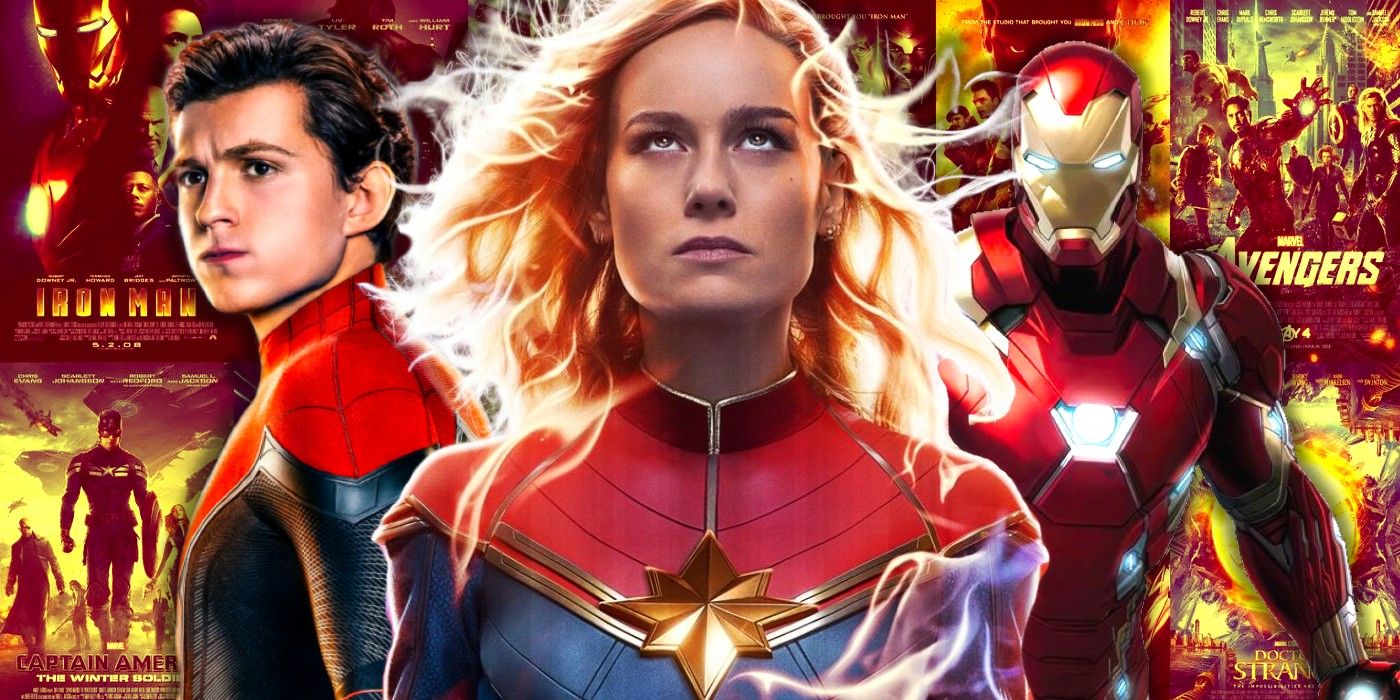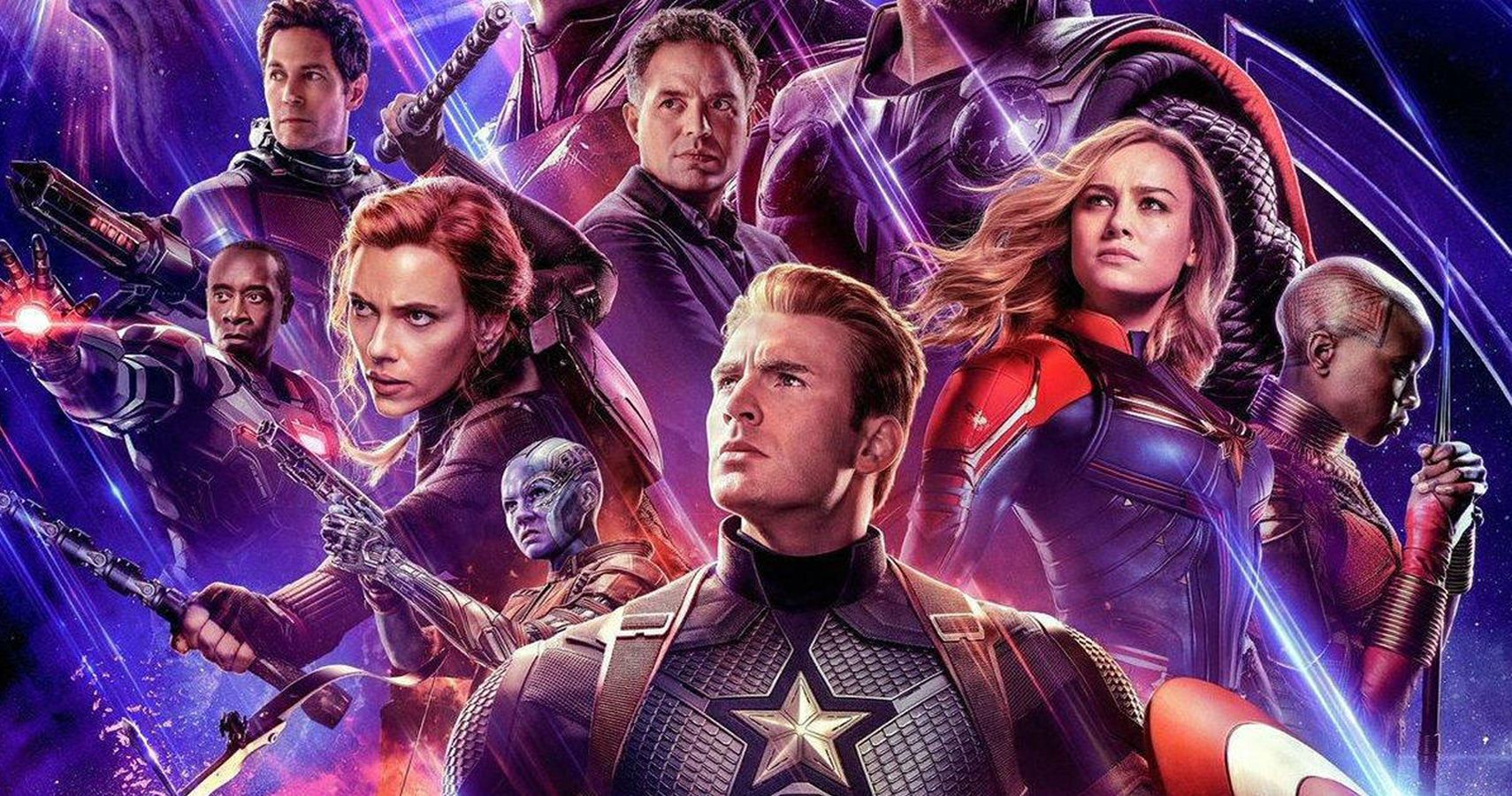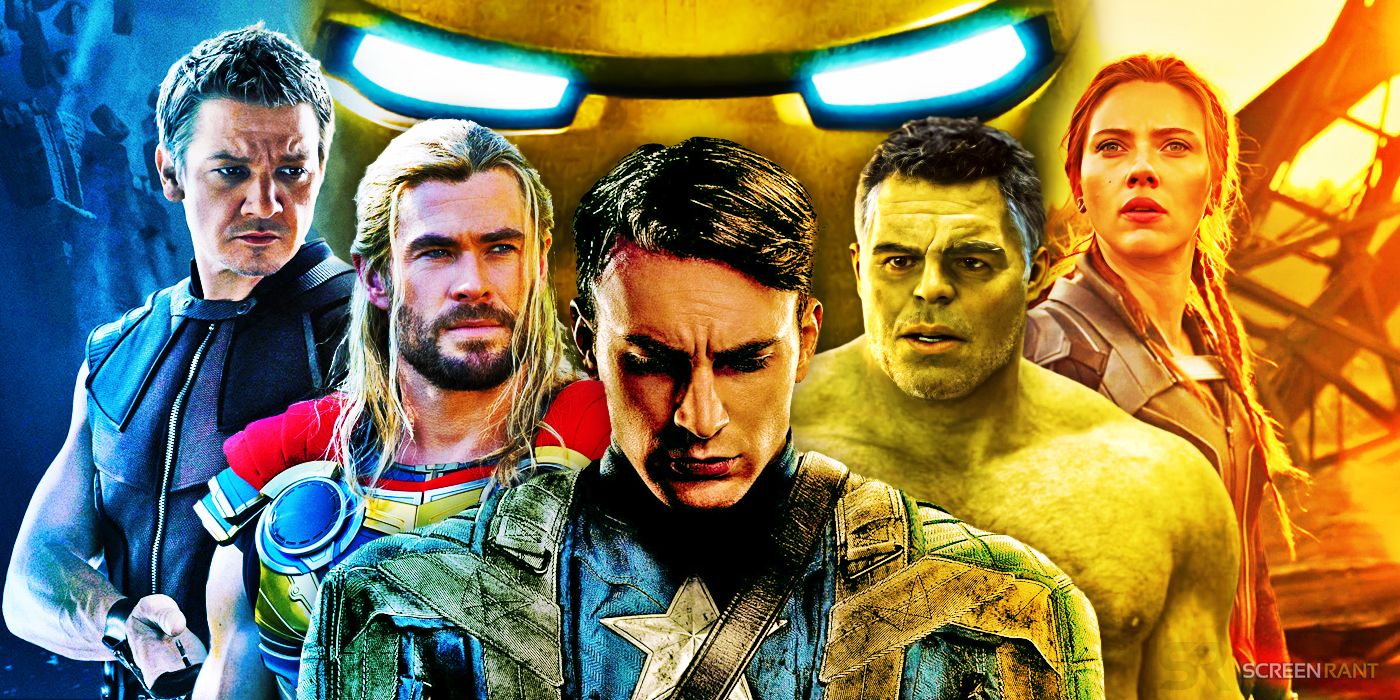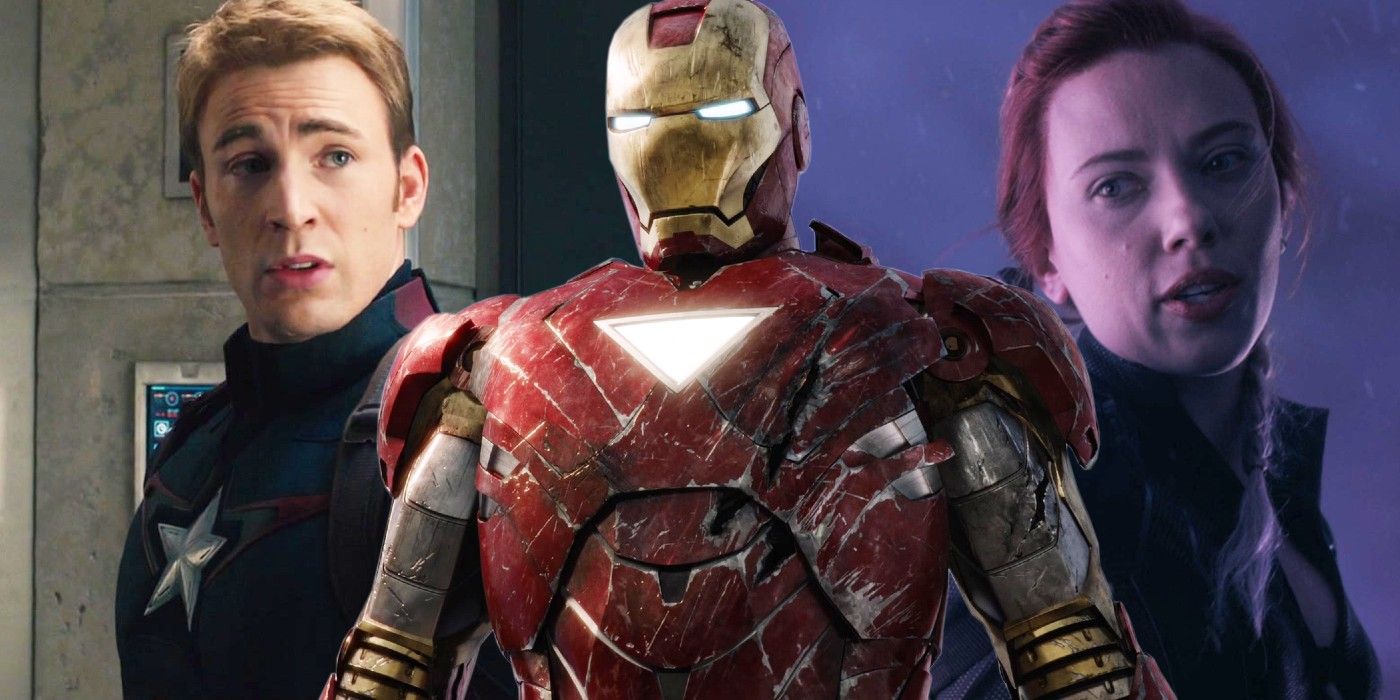Summary
- The Avengers and its sequels remain among the best movies in the MCU, showcasing groundbreaking team-ups and crossovers.
- The upcoming Avengers: The Kang Dynasty will mark a 7-year gap between tentpole team-up movies, making the previous Avengers projects even more significant.
- Avengers: Age of Ultron, Avengers: Infinity War, and Avengers: Endgame each have their strengths and weaknesses, but they are still impressive achievements in the MCU, with memorable moments, iconic villains, and a satisfying conclusion to the Infinity Saga.
The Avengers and its three sequels are the crowning achievements of the MCU, but while they're all iconic in their own ways, they don't all reach the same heights. While team-ups and crossovers are now an assumed part of every Marvel Studios release, it can be difficult to remember just how groundbreaking it was to see Nick Fury recruit Tony Stark for the Avengers Initiative and later get six iconic heroes together in the same film. While the novelty has worn off with time, the series has aged incredibly well, and the four Avengers projects still remain among the MCU's best.
The projects seem even more important now, given the huge gap in the MCU timeline between Avengers projects. By the time the upcoming Avengers: The Kang Dynasty hits theaters in 2026, it will have been 7 long years between tentpole team-up movies. Given that, it's well worth revisiting The Avengers, Avengers: Age of Ultron, Avengers: Infinity War, and Avengers: Endgame to relive the MCU's biggest and arguably best movies.

Every Marvel Cinematic Universe Movie Ranked Worst To Best
Over 15 years and 33 movies, the Marvel Cinematic Universe movies have redefined blockbuster cinema. But how do all the films stack up?4 Avengers: Age of Ultron (2015) Is A Few Poor Decisions Away From Being Great
Age Of Ultron Felt Too Much Like Setup For Future Movies
Avengers: Age of Ultron
- Release Date
- May 1, 2015
- Director
- Joss Whedon
- Cast
- Chris Hemsworth , Clark Gregg , Robert Downey Jr. , Cobie Smulders , Aaron Taylor-Johnson , Jeremy Renner , Thomas Kretschmann , Chris Evans , Don Cheadle , Mark Ruffalo , Elizabeth Olsen , Scarlett Johansson , Paul Bettany , Samuel L. Jackson , James Spader
Three years after the Battle of New York, the Avengers are in fine form as they bust Hydra cells and enjoy their newfound friendship. But when Stark inadvertently creates the titular, rogue artificial intelligence, the threat of Ultron (James Spader) and his temporary lackeys (Elizabeth Olsen and Aaron Taylor Johnson) tests each hero’s confidence – and their trust in each other. Despite being fairly similar to The Avengers, Age of Ultron remains one of Marvel’s divisive entries. Ultron doesn't quite live up to his menacing introduction, and the project overall feels like it sets too much up and doesn't resolve quite enough.
Avengers: Age of Ultron is directed by Joss Whedon, who also directed The Avengers. For Avengers: Infinity War and Avengers: Endgame, directing responsibilities shifted to Joe and Anthony Russo.
When making Age of Ultron, director Joss Whedon said that his aim was “to pull [the Avengers] apart as much as we put them together.” This deconstructive approach should have worked wonders for the characters - and the film at large. Indeed, Scarlet Witch’s visions force the team to confront their demons and desires, particularly during an interlude at a safe house. These portions of Age of Ultron later proved important for Iron Man and Captain America’s larger arcs through the MCU. But in the context of Age of Ultron alone, Whedon’s execution hampers the overall effect.
In watching Age of Ultron, there’s a feeling that a lot of footage that shouldn’t have been cut is missing. Conversely, there are clearly some scenes that should have been removed or trimmed. These aforementioned, lengthy character moments occur in a rather brisk story, meaning that Age of Ultron’s pacing – and its new characters – consequently suffer. This is obviously thanks to the director’s well-documented creative differences with Marvel. Nevertheless, it’s particularly frustrating for viewers when fascinating characters like Vision (Paul Bettany) are short-changed.
3 Avengers: Infinity War (2018) Introduces The Franchise's Most Iconic Villain
Third Place Isn't Bad With Such Staunch Competition
The dreaded Thanos makes good on his promise from Age of Ultron’s post-credit scene, and he wages a swift and brutal war against the universe in his search for the Infinity Stones. Naturally, this puts him on a collision course with the disbanded and disheartened Avengers. But even with reinforcements, in the form of Doctor Strange (Benedict Cumberbatch) and the Guardians of the Galaxy, the heroes prove ill-prepared to beat the Mad Titan.
Given how positively received Infinity War proved to be, it may be difficult to remember just how big of a risk it was. Despite now being the MCU's most iconic villain, Thanos had only been seen in short scenes, and nothing was known about his larger motivation. Thanos' MCU-exclusive goal of halving the population to end overcrowding and resource scarcity doesn't sound as exciting on paper as the Marvel Comics story of committing mass murder to impress the goddess of death, but the more grounded underlying story gives weight to an otherwise fantastical film.

Avengers: 10 Things Infinity War Does Better Than Endgame
There's no doubt that Avengers: Endgame stands among the best Marvel movies, but here are 10 moments that could have been improved.As the culmination of ten years' worth of superhero films, it’s astounding that the movie was able to meet, or perhaps exceed, expectations in such a grand and epic fashion. Indeed, the Guardians of the Galaxy duology showed viewers exotic new planets, but the Russo Brothers render worlds like Vormir and Nidavellir with rich colors and strong composition. The cosmic MCU has never had such a degree of depth and texture, and it feels suitably expansive and spectacular.
Moreover, Thanos himself is a groundbreaking accomplishment in visual effects and immediately proved worthy of being a saga-closing villain overall. The impressive motion capture technology showcased makes him, despite being purple and eight feet tall, amazingly life-like and physically imposing. This is compounded by Josh Brolin’s stoic, beguiling presence, meaning that Thanos’ intelligence and power are worryingly palpable any time he’s onscreen with any of the saga’s heroes.
|
Every Thanos Appearance In MCU Movies |
|---|
|
The Avengers (2012) |
|
Guardians of the Galaxy (2014) |
|
Avengers: Age of Ultron (2015) |
|
Avengers: Infinity War (2018) |
|
Avengers: Endgame (2019) |
Furthermore, Infinity War makes good on highly anticipated character meetings, bringing together heroes from all corners of the MCU. The clash of Stark and Doctor Strange’s egos is brilliant to witness, but Infinity War also revels in showcasing unexpected team-ups. The partnership between Thor and his “sweet rabbit” Rocket (Bradley Cooper) is one of the MCU’s funniest, but it also features some of the franchise’s most heartbreaking moments as well. Moments like their shuttle ride chat are a testament to how deftly Marvel has crafted their characters onscreen. Moreover, it’s the very reason why the film’s shocking ending works as well as it does.
2 Avengers: Endgame (2019) Perfectly Wraps Up The MCU's Infinity Saga
The Risky Time Travel Plot Works Well
Avengers: Endgame
- Release Date
- April 26, 2019
- Director
- Joe Russo , Anthony Russo
- Cast
- Chris Hemsworth , Anthony Mackie , Paul Rudd , Robert Downey Jr. , Scarlett Johansson , Mark Ruffalo , Evangeline Lilly , Sebastian Stan , Josh Brolin , Elizabeth Olsen , Tom Holland , Don Cheadle , Samuel L. Jackson , Bradley Cooper , Karen Gillan , Brie Larson , Paul Bettany , Chris Evans , Jeremy Renner , Chadwick Boseman
Defeated and despondent, the remaining Avengers struggle to negotiate the dystopia that Thanos created at the end of Infinity War. But when Ant-Man miraculously returns from the Quantum Realm some five years later, they see an opportunity to undo the Mad Titan’s work and save the universe. As impressive as it was for Infinity War to kick-start the saga-ending duology, it's even more impressive that Endgame sticks the landing.
As the culmination of eleven years and twenty-two movies’ worth of plot, Endgame has quite a juggling act to perform. Indeed, in this celebratory entry, Earth’s Mightiest Heroes literally revisit their previous adventures whilst the movie itself brings their current one to a close. But where Infinity War was (mostly) focused and successful at this plate-spinning, Endgame, unfortunately, begins to buckle under the sheer weight of its disparate parts.
It also doesn’t help that many of the narrative choices in Avengers: Endgame are somewhat confounding. The introduction to time travel in the MCU has, somewhat admirably, been constructed to leave the events of prior MCU movies intact. Yet, as a result, the film becomes overly complex, and the rules have been broken several times in the years since Endgame.
However, the fact that Endgame works half as well as it does is impressive in itself. The benefits of the shared universe model are plain to see, as the movie’s heavy character focus could not have been this impactful without the interwoven saga that preceded it. the whole cast provides some of their best work in Endgame, which not only contains some of the franchise’s most quietly harrowing scenes but also several of the most thrilling and emotional. Endgame is undoubtedly imperfect, but it’s a film with a sense of fun, dread, and scale that feels earned and more than makes up for its shortcomings.
1 The Avengers (2012) Still Holds Up Over A Decade Later
The Blockbuster That Solidified The MCU's Place In Cinema History
The Avengers
- Release Date
- May 4, 2012
- Director
- Joss Whedon
- Cast
- Chris Hemsworth , Mark Ruffalo , Robert Downey Jr. , Scarlett Johansson , Samuel L. Jackson , Stellan Skarsgård , Clark Gregg , Paul Bettany , Cobie Smulders , Tom Hiddleston , Jeremy Renner , gwyneth paltrow , Chris Evans
Following on from the events of Thor, a disenfranchised Loki (Tom Hiddleston) attempts to conquer Earth with an alien army. In response, S.H.I.E.L.D. director Nick Fury recruits an unlikely team to foil his plans, and they may succeed – if they can get along, that is. The Avengers was an unprecedented superhero movie release, and the effect it's had on the genre - and blockbuster movies as a whole - can't be overstated.
At this point, there’s very little to say that hasn’t already been said about The Avengers. Like Infinity War, it’s remarkable that the film succeeds as well as it does when it could have very easily collapsed under its own weight. This success can be attributed to the charisma of its stars and their characters, but mostly to the talents of writer and director Joss Whedon. Sure, The Avengers does not exhibit any of the MCU’s best camerawork and cinematography, but its key strength is its script and pacing.

All 6 Original Avengers Ranked By Importance To The MCU
All six Avengers are very important to the Infinity Saga and overall MCU, but some of them have had a bigger impact on the franchise than the others.Indeed, the film is – to quote Thanos – perfectly balanced where its storytelling is concerned. For all its humor, there are numerous sobering beats, such as Black Widow’s discussion with a caged Loki and Captain America’s disagreement with Iron Man aboard the Helicarrier. There are a lot of action scenes (as one would expect in a superhero movie), but Whedon ensures that each character gets a good few moments to shine out of costume so that we are able to connect with them.
Certainly, their many meetings and confrontations are a master class in escalation and anticipation, building on what came before and following through to the next encounter. There’s a reason why the iconic, circling shot of the united team works as well as it does, and it isn’t just because of Alan Silvestri’s rousing score. All of The Avengers’ narrative arcs feed into this moment; the film's plot strands unite as the characters do themselves.
|
Where Each Original Avenger Is Now In The MCU |
|
|---|---|
|
Steve Rogers/Captain America |
Retired But Presumably Alive After Going Back In Time And Living A Life With Peggy Carter |
|
Tony Stark/Iron Man |
Sacrificed Himself To Snap Away Thanos And His Army in Avengers: Endgame |
|
Thor Odinson |
Still Alive And Raising Gorr's Daughter |
|
Natasha Romanoff/Black Widow |
Sacrificed Herself On Vormir To Get Hawkeye The Soul Stone |
|
Clint Barton/Hawkeye |
Alive, But Possibly Retired After His Time With Kate Bishop |
|
Bruce Banner/Hulk |
Merged With The Hulk Persona Into "Smart Hulk" And Has United With His Son, Skaar |
It also helps that this is one of Marvel’s most quotable movies. The MCU was no stranger to wit by this point, but The Avengers set the standard for rapid, mid-action scene one-liners that have come to populate their newer films. Coupled with its clean choreography, The Avengers provided the kind of humorous and exhilarating experience that audiences want from their blockbusters.
Moreover, towards the end of The Avengers, Gideon Malik (Powers Boothe) wonders whether Fury has assembled the team to make a defiant statement to the wider universe. Years later, this is a perfect metaphor for Marvel itself. As the number of Marvel movies continue to increase, it’s clear that The Avengers not only changed superhero movies forever – but also Hollywood in the process.

